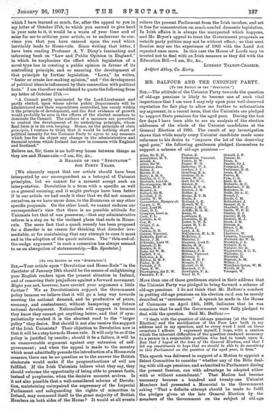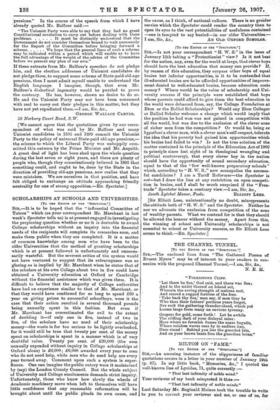MR. BALFOUR AND THE UNIONIST PARTY.
Ito THE EDITOR OS TRH "Srscuroa.1
Sts,—The attitude of the Unionist Party towards the question of old-age pensions is likely to become one of such vital importance that I am sure I may rely upon your well-deserved reputation for fair play to allow me further to substantiate my argument, in a recent issue, that the Unionists are pledged to support State pensions for the aged poor. During the last few days I have been able to see an analysis of the election addresses of the whole of the Unionist candidates at the General Election of 1895. The result of my investigation shows that while nearly every Unionist candidate made some reference to his desire to "improve the lot of the deserving aged poor," the following gentlemen pledged themselves to support a scheme of old-age pensions :—
Allen, Sir H. H. Flower, E.
Anstruther, H. T. Folkestone, Viscount.
Arnold, A. Foster, H. W. Arrol, Sir W. Foster, W. If. Atkinson, Jan. Galloway, W. J.
Bailey, J. Gordon, J. E. Barnes, F. G. Goulding, Si A.
Barry, A. IX. S. Graham, IL R. Bartley, G. C. T. Green, W. D. Bentinck, Lord 11. Gull, Sir W. C. Bhownaggree, M. M. Gunter, R. Bowles, H. F. Hatch, E. P.O. 1 Heaton, J. II.
133'ulterS., ay A. H. Helder, A. Butcher, J. G. Hodge, H. T. H.
Carina, W. W.
Corbett, A. C. Cox, R. Cripps, C. A. Cross, A.
CHSZOO, G. N. Carson, Viscount. Dalkeith, Earl of Denny, J. M. D'Eresby, Lord W. Disraeli, C. R. Dentin, B. S. Dyke, Sir W. H. Fardell, T. G. Fellow., A E. Hatton, H. IL F. Finlay, R. B. Firbank, J. T. Fison, F. W. Fitswygram. Sir F. W. pisarery, F. F.
More than one of these gentlemen stated in their address that the Unionist Party was pledged to bring forward a scheme of old-age pensions. I do not think that Mr. Balfour's conduct in putting old-age pensions on his election card can be merely described as "carelessness." A speech he made in the House of Commons on April 24th, 1899, indicates that he was conscious that he and the Government were fully pledged to deal with the question. Said Mr. Balfour :— -
"I dealt with the question of old-age pensions [at the General Election] and the modification of the Poor Law both in my address and in my speeches, and to every word I said on these occasions I adhere. I expressed myself, I hope, with a caution which the inherent difficulties of the question rendered necessary to a person in a responsible position who had to touch upon it. But that I hoped at the time of the General Election, and that I led my constituents to hope that we should be able to its something in this Parliament on the question o/ the aged poor, is true."
This speech was delivered in support of a Motion to appoint a Select Committee to consider "whether any of the Bills deal- ing with old-age pensions, and submitted to Parliament during the Present Session, can with advantage be adopted either with or without amendment." That Motion had become necessary because a hundred and twenty-one Unionist Members had presented a Memorial to the Government asking "ha a definite attempt should be made to fulfil the pledges given at the late General Election by the members of the Government on the subject of old-ago
Hoare, S.
Carmarthen, Maronin of. Holland, L. R.
Cayser, C. W. Howell, W. T. Cecil, Lord H. Hosier, J. H. C. Clare, D. L. Jolliffe, 11, G. H. Compton. Lord A. Kemp, G. Lawrence, E. Llewellyn, E. H. Loder, G. W. E. Lopes, H. Y. B. Lewis,. J. Loyd, A. K. McCalmont, H. L. B. NcKillop, Malcolm, I. Manners, Lord E. Harks, II. H. Melville, B. V. Mildmay, F. B. Milton, Viscount Ml board. V. Moon, E. R. P. Morgan, F. C. Morrell, OH. Murdock, C. T. Newdigate, F. A. likol D. N. Oswald, .J.
Palmer, D.
Pease, A.
Pander, Sir J. Pierpolut, R. Pretyroan, E.G. Jones, E. P. Purvis, B.
Pym, C. G.
Reed, H. B. Richards, H. C. Robertson, T. H. Robinson, B. Rollit, Sir A. K. Round, 3.
Boyd., C. H. Rutherford, J. Samuel, H. S. Shadwell, W. J. Smith, W. P. D. Stanley, E. J. Stanley, H. St. Stewart, M. J. Stock, J. H. Stream, A.
Strad, C. H. Taylor, F.
Thorburn, W. Valentin, Viecount Walrond, Sir W. H. Wanklyn, .7. L. Webster, E.G. Webster. Sir R. Wentworth, B. C. V. Whiteley, G. Whiteley, H. Wigrain, A. M. Wilson, J. Wyndham.Quinn, W. H. Wyvill, M. D. Younger, W. pensions." In the course of the speech from which I have
• already quoted Mr. Balfour said :—
" The Unionist Party were able to say that they had no great Constitutional revolution to carry out before dealing with these
problems It must be distinctly understood that the Government do not consider themselves bound to wait necessarily for the Report of the Committee before bringing forward a
scheme We hope that the general lines of such a scheme may be indicated within a period which will enable us to have the full advantage of the weight of the advice of the Committee before we present any plan of our own."
If these extracts from Mr. Balfour's speeches do not pledge him, and the election addresses of Unionist candidates do not pledge them, to support some scheme of State-paid old-age pensions, than I must admit myself unable to understand the English language. I imagine, though, that even Mr. BalfouFs dialectical ingenuity would be puzzled to prove the contrary. He has, however, shown no desire to do so. He and the Unionist Party may not have been consumed with zeal to carry out their pledges in this matter, but they have not yet repudiated them.—I am, Sir, &c.,
GEORGE WALLACE CARTER.
38 Norbury Court Road, S. W.
• [We cannot agree that the quotations given by our cos-re- spondent of what was said by Mr. Balfour and many • Unionist candidates in 1895 and 1899 commit the Unionist Party to the policy of universal State-paid old-age pensions,— . the scheme to which the Liberal Party was unhappily com- mitted this autumn by the Prime Minister and Mr. Asquith. A great deal of light has been shed upon the whole question during the last seven or eight years, and there are plenty of people who, though they conscientiously believed in 1895 that something could, and ought to be, done by the State in the direction of providing old-age pensions, now realise that they were mistaken. We are ourselves in that position, and have felt obliged to exchange an attitude approaching friendly neutrality for one of strong opposition.—En. Spectator.]























































 Previous page
Previous page